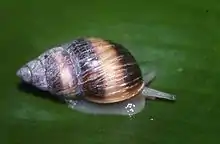Partula suturalis
Partula suturalis, common name the moorean viviparous tree snail or sutural partula, is a species of air-breathing tropical land snail, a terrestrial pulmonate gastropod mollusk in the family Partulidae. This species was endemic to the island of Moorea, French Polynesia. It is now extinct in the wild. It was previously listed as extinct in the IUCN Red List of Threatened Species,[2] but has been moved to extinct in the wild since 2009.[1] This error was the result of changing taxonomy (the subspecies were previously considered to be separate species).
| Partula suturalis | |
|---|---|
 | |
| Scientific classification | |
| Kingdom: | |
| Phylum: | |
| Class: | |
| Order: | |
| (unranked): | clade Heterobranchia clade Euthyneura clade Panpulmonata clade Eupulmonata clade Stylommatophora informal group Orthurethra |
| Superfamily: | |
| Family: | |
| Genus: | |
| Species: | P. suturalis |
| Binomial name | |
| Partula suturalis Pfeiffer, 1855 | |
Subspecies
- Partula suturalis suturalis Pfeiffer, 1855 - extinct
- Partula suturalis dendroica Crampton, 1924 [3]
- Partula suturalis strigosa Pfeiffer, 1856 - extinct in the wild
- Partula suturalis vexillum Pease, 1866 - extinct in the wild
Extinction in the Wild
Partula suturalis was extirpated due to the introduction of the carnivorous land snail Euglandina rosea (the rosy wolfsnail). In 1977, biologists deliberately released the rosy wolfsnail onto Moorea Island in an effort to control a previously introduced invasive species, the giant African land snail, Lissachatina fulica. This release coincided with additional releases of rosy wolfsnails on Tahiti and other Society Islands in the 1980s and 1990s. The release of rosy wolfsnails on Moorea island resulted in the extirpation of all 9 of the Moorean partula species including Partula suturalis. [4] By 1987, there were no remaining populations of Partula suturalis in the wild. [5]
Interventions before extinction created captive populations of two of the four subspecies in international zoos and universities. The Partulid Global Species Management Programme manages the global captive population.
Reintroduction Efforts
Reintroduction of Moorean partula snails, including Partula suturalis, was attempted in 1994. However, the field reserve created on Moorea island struggled with repeated predator incursions and was shut down in 1998. The experiment was successful in validating that individuals bred in captivity were capable of reproducing in the wild.[6] Continued reintroduction efforts will be challenged by the continued spread of the invasive rosy wolfsnail.
References
- Coote, T. (2009). "Partula suturalis". IUCN Red List of Threatened Species. 2009: e.T16281A5596154. doi:10.2305/IUCN.UK.2009-2.RLTS.T16281A5596154.en.
-
- Mollusc Specialist Group 1996. Partula suturalis. 2006 IUCN Red List of Threatened Species. Downloaded on 7 August 2007.
- "Partula suturalis dendroica". National Center for Biotechnology Information - Taxonomy browser. Retrieved 26 February 2014.
- Lee, Teahwan; Burch, John B; Coote, Trevor; Pearce-Kelly, Paul; Hickman, Carole; Meyer, Jean-Yves; Foighil, Diarmaid (2009). "Moorean tree snail survival revisited: a multi-island genealogical perspective". BMC Evolutionary Biology. 9: 204. doi:10.1186/1471-2148-9-204. PMC 3087522. PMID 19686604.
- Coote, Trevor; Loeve, Eric (January 2003). "From 61 species to five: endemic tree snails of the Society Islands fall prey to an ill-judged biological control programme" (PDF). Oryx. 37 (1): 91. doi:10.1017/S0030605303000176. Retrieved 28 April 2019.
- Coote, Trevor; Clarke, Dave; Hickman, Carole Jean Stentz; Murray, James; Pearce-Kelly, Paul (July 2004). "Experimental Release of Endemic Partula Species, Extinct in the Wild, into a Protected Area of Natural Habitat on Moorea". Pacific Science. 58 (3): 429. doi:10.1353/psc.2004.0028.
